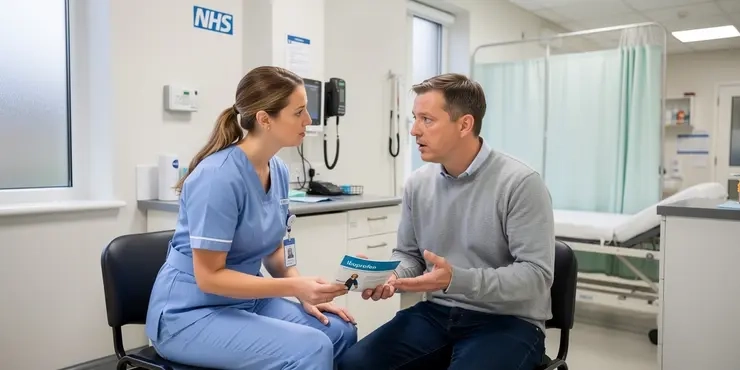
Find Help
More Items From Ergsy search
-

Can I use Ibuprofen for menstrual pain?
Relevance: 100%
-

What is Ibuprofen?
Relevance: 55%
-

What is the difference between Aspirin, Paracetamol, and Ibuprofen?
Relevance: 53%
-

Can Ibuprofen be used to reduce inflammation?
Relevance: 52%
-

Are Aspirin and Ibuprofen the same?
Relevance: 52%
-

Can I take Aspirin and Ibuprofen together?
Relevance: 49%
-

What are the side effects of Ibuprofen?
Relevance: 48%
-
What is the difference between aspirin, paracetamol, and ibuprofen?
Relevance: 47%
-

Is it safe to take Paracetamol with Ibuprofen?
Relevance: 45%
-

Can I take ibuprofen and paracetamol together? - Common Health Questions | NHS
Relevance: 44%
-

Heavy periods (heavy menstrual bleeding)
Relevance: 43%
-

Is a mammogram painful?
Relevance: 42%
-

Which one is better for toothache: Ibuprofen or Paracetamol?
Relevance: 42%
-

Period pain (dysmenorrhoea) - BSL
Relevance: 41%
-

Is the womb lining test painful?
Relevance: 40%
-

Will the test affect my menstrual cycle?
Relevance: 40%
-

How to deal with period pain | NHS
Relevance: 38%
-

How to deal with period pain | NHS
Relevance: 37%
-

How to deal with period pain | NHS
Relevance: 37%
-

Is a womb lining test painful?
Relevance: 37%
-

Treating breast pain | United Lincolnshire Hospitals NHS Trust
Relevance: 36%
-

Can the test be performed during my menstrual period?
Relevance: 36%
-

How to deal with period pain | NHS
Relevance: 35%
-

Stomach ache and abdominal pain
Relevance: 33%
-

How do NSAIDs work to reduce pain?
Relevance: 32%
-

Shoulder pain | NHS
Relevance: 31%
-

Is impetigo painful?
Relevance: 31%
-

How can I manage pain after a C-section?
Relevance: 31%
-

Heel pain | NHS
Relevance: 30%
-

How to treat back pain | NHS
Relevance: 29%
-

Useful information for patients with lower back pain
Relevance: 28%
-

NHS 24 | Self-help tips for dental pain
Relevance: 28%
-

Advice on neck pain and whiplash
Relevance: 28%
-

What is the role of pain management in treating whiplash?
Relevance: 28%
-

Shoulder pain | NHS
Relevance: 27%
-

Useful information for patients with lower back pain
Relevance: 27%
-

NHS 24 | How to get help for dental pain
Relevance: 27%
-
Shoulder pain | NHS
Relevance: 27%
-

Foot Pain
Relevance: 27%
-

Is a facelift painful?
Relevance: 26%
Understanding Menstrual Pain
Menstrual pain, also known as dysmenorrhea, is a common issue that many women experience during their menstrual cycle. It can range from mild discomfort to severe pain, affecting daily activities and quality of life. Commonly, women seek over-the-counter remedies to alleviate these symptoms. One popular option is ibuprofen, a nonsteroidal anti-inflammatory drug (NSAID). But is ibuprofen effective and safe for managing menstrual pain?
What is Ibuprofen?
Ibuprofen is a widely-used NSAID that helps reduce hormones causing inflammation and pain in the body. It is available under several brand names in the UK, including Nurofen and Brufen, and is also sold as a generic medicine. Ibuprofen comes in various forms, such as tablets, capsules, and liquid suspensions, allowing for flexibility in administration based on personal preference.
Effectiveness of Ibuprofen for Menstrual Pain
Many studies have shown that ibuprofen can be highly effective in managing menstrual pain for most women. It works by inhibiting the production of prostaglandins, chemicals in the body that trigger uterine contractions and lead to pain and inflammation. By reducing the levels of prostaglandins, ibuprofen can help alleviate the severity of cramps experienced during menstruation.
How to Use Ibuprofen for Menstrual Pain
For best results, it is recommended to take ibuprofen at the onset of menstrual pain or even slightly before the pain begins, if possible. The standard dosage for an adult in the UK is usually 200 mg to 400 mg taken every four to six hours, as needed. However, it is crucial not to exceed the maximum daily dose of 1200 mg unless advised by a healthcare professional.
Safety and Side Effects
While ibuprofen is generally safe when used as directed, it is important to be aware of potential side effects. Common side effects include stomach upset, nausea, and heartburn. To minimize gastrointestinal issues, ibuprofen should be taken with food or milk. More serious but less common side effects can include gastrointestinal bleeding, increased blood pressure, and kidney issues, especially with long-term use or in individuals with pre-existing conditions.
When to Consult a Doctor
It is advisable to consult a healthcare provider if menstrual pain is severe, persistent, or not relieved by ibuprofen, as this may indicate an underlying condition such as endometriosis or fibroids. Additionally, individuals with a history of stomach ulcers, liver disease, or kidney problems should seek medical advice before using ibuprofen.
Conclusion
Ibuprofen is a common, effective option for managing menstrual pain in many women. By understanding how to use it safely and recognizing when to seek medical advice, individuals can effectively manage their symptoms and maintain their quality of life. Always consider consulting a healthcare professional if uncertain about the use of ibuprofen or if symptoms persist.
Understanding Period Pain
Period pain is something many women feel when they have their period. It can hurt a little bit or a lot, making it hard to do things every day. Many women use medicine to help. One medicine is called ibuprofen. Let's find out if ibuprofen is good and safe to help with period pain.
What is Ibuprofen?
Ibuprofen is a medicine that helps stop pain and soreness in the body. It is sold under names like Nurofen and Brufen in the UK. You can get it as tablets, capsules, or liquid, and use what works best for you.
How Ibuprofen Helps with Period Pain
Ibuprofen can help a lot with period pain for most women. It stops things called prostaglandins, which make the womb squeeze and cause pain. By lowering prostaglandins, ibuprofen can make period cramps hurt less.
How to Take Ibuprofen for Period Pain
For the best help, take ibuprofen when period pain starts, or even a little before. Adults in the UK usually take 200 mg to 400 mg every 4 to 6 hours if needed. But do not take more than 1200 mg a day unless your doctor says it's okay.
Safety and Side Effects
Ibuprofen is mostly safe if you follow the directions. Some people might get an upset tummy, feel sick, or get heartburn. To keep your tummy safe, take ibuprofen with food or milk. Some rare but serious problems can happen, like bleeding in the stomach, high blood pressure, or kidney issues, especially if taken a lot or if you have certain health problems.
When to See a Doctor
See a doctor if the period pain is very bad, doesn’t stop, or if ibuprofen doesn’t help. This might mean another health issue like endometriosis or fibroids. People who have had ulcers or have liver or kidney problems should ask a doctor before taking ibuprofen.
Conclusion
Ibuprofen can help many women with period pain. Knowing how to use it safely and when to get more help can make life better. Always ask a doctor if you’re unsure about using ibuprofen or if pain continues.
Frequently Asked Questions
Can I use ibuprofen for menstrual pain?
Yes, ibuprofen is commonly used to relieve menstrual cramps and pain.
How does ibuprofen help with menstrual pain?
Ibuprofen helps by reducing the production of prostaglandins, which decreases inflammation and relieves menstrual cramps.
What is the recommended dosage of ibuprofen for menstrual pain?
The typical dosage for adults is 200-400 mg every 4-6 hours, but you should not exceed 1200 mg in 24 hours unless advised by a doctor.
How long does it take for ibuprofen to work for menstrual cramps?
Ibuprofen usually starts to work within 30 minutes to an hour after taking it.
Are there any side effects of taking ibuprofen for menstrual pain?
Common side effects include stomach upset, nausea, and dizziness. Serious side effects may include gastrointestinal bleeding or kidney issues.
Can I take ibuprofen on an empty stomach for menstrual pain?
It's better to take ibuprofen with food or a full glass of water to minimize the risk of stomach upset.
Is ibuprofen more effective than other pain relievers for menstrual cramps?
Ibuprofen is often more effective than acetaminophen for menstrual cramps because it reduces inflammation, but results can vary for each individual.
Can I take ibuprofen if I am pregnant and experiencing menstrual-like pain?
You should consult a healthcare provider before taking ibuprofen during pregnancy.
Is it safe to take ibuprofen regularly every month for menstrual pain?
Regular use is generally safe if taken as directed, but consult a doctor if you have concerns or underlying health conditions.
Can I combine ibuprofen with other medications for menstrual pain relief?
You should consult a healthcare provider before combining ibuprofen with other medications, especially other NSAIDs or blood thinners.
Can teenagers take ibuprofen for menstrual cramps?
Yes, teenagers can take ibuprofen, but the dosage should be adjusted for age and weight. Always follow the guidance of a healthcare provider.
Does ibuprofen reduce menstrual bleeding?
Ibuprofen can help reduce heavy menstrual bleeding by reducing the production of prostaglandins.
What should I do if ibuprofen doesn’t relieve my menstrual pain?
Consult a healthcare provider for other treatment options or to rule out other conditions.
Can I build a tolerance to ibuprofen if I take it frequently for menstrual pain?
There is no evidence that you become tolerant to ibuprofen, but long-term use can increase the risk of side effects.
Are there any contraindications for ibuprofen use in menstrual pain?
Yes, contraindications include a history of ulcers, kidney disease, or allergic reactions to NSAIDs.
Can ibuprofen delay my menstrual period?
Ibuprofen does not typically delay menstruation, but if you have concerns about your cycle, consult a healthcare provider.
Is prescription-strength ibuprofen better for severe menstrual pain?
Prescription-strength ibuprofen may be used for more severe pain, but a doctor should be consulted for appropriate dosage.
How often can I safely take ibuprofen for menstrual pain during my period?
You can take it every 4-6 hours as needed, but do not exceed 1200 mg in 24 hours unless directed by a doctor.
Should I avoid certain foods or drinks when taking ibuprofen for menstrual pain?
Avoid alcohol as it can increase the risk of gastrointestinal bleeding when taking ibuprofen.
Is there anyone who should not take ibuprofen for menstrual pain?
Individuals with a history of ulcers, severe kidney or liver problems, or an allergy to NSAIDs should avoid ibuprofen.
Can I take ibuprofen for period pain?
Yes, you can use ibuprofen to help with period pain and cramps.
How does ibuprofen help with period pain?
Having pain during your period can be uncomfortable. Ibuprofen is a medicine that can help you feel better.
Ibuprofen works by stopping your body from making chemicals that cause pain and swelling. These chemicals are called prostaglandins. When there are fewer prostaglandins, you don’t feel as much pain.
Here are some tips to help you remember:
- Take ibuprofen with food or a drink to protect your tummy.
- Follow the instructions on the medicine packet.
- If you need help, ask an adult or a doctor.
You can also use heat, like a warm water bottle, on your tummy to feel better.
Ibuprofen helps by making less prostaglandins. This reduces swelling and stops period pain.
How much ibuprofen should I take for period pain?
If you have period pain, you can take ibuprofen. It can help you feel better.
Check the packet for how much to take. Usually, for children, it is 200 mg every 6 to 8 hours. Adults can take 400 mg every 6 hours.
But don't take more than the packet says. If you are unsure, ask a doctor or someone who works at a pharmacy.
Grown-ups can take 200 to 400 mg every 4 to 6 hours. Do not take more than 1200 mg in one day unless your doctor says it's okay.
How long does it take for ibuprofen to help with period pain?
Ibuprofen is a medicine. It helps with pain.
If you take it for period pain, it usually starts working in 30 minutes to 1 hour.
It can help to use a warm heat pack on your belly too.
Ibuprofen starts to work about 30 minutes to 1 hour after you take it.
Can taking ibuprofen for period pain cause any problems?
Ibuprofen can help with period pain, but sometimes it can cause problems too. Here are a few things to watch out for:
- It might make your tummy feel upset.
- You could get a headache.
- It might make you feel dizzy.
If you feel any of these, tell an adult or talk to a doctor.
It's always good to ask someone you trust if you're not sure.
When you take this medicine, you might feel a tummy ache, feel sick, or feel dizzy. Some people might have bigger problems like bleeding inside their tummy or trouble with their kidneys.
Tips to help you:
- Use a dictionary to understand new words.
- Ask someone to read with you and explain things.
- Take breaks if you need to.
Can I take medicine for period pain without food?
Sometimes your tummy can feel sore if you take medicine without eating.
It is best to eat a little food first.
If you are not sure, ask a grown-up or a doctor for help.
Try using a reminder or talking app to help you remember when to take your medicine.
It's safer to take ibuprofen with some food or a whole glass of water. This helps to stop your tummy from feeling upset.
Does ibuprofen work better for period pain than other medicines?
Ibuprofen can work better than acetaminophen for period pain. It helps by reducing swelling inside the body. But remember, everyone is different, so it may not work the same for you.
Can I take ibuprofen if I am pregnant and have pain like period pain?
If you are pregnant and have pain that feels like period pain, it's best to talk to a doctor or nurse before taking any medicine, like ibuprofen.
They can tell you what is safe to take.
Asking a grown-up for help is a good idea.
Talk to a doctor before you take ibuprofen if you are pregnant.
Is it okay to take ibuprofen every month for period pain?
Ibuprofen can help with period pain. But it's important to know if it is safe to use often.
Here are some things to remember:
- Talk to a doctor or nurse. They can tell you if ibuprofen is right for you.
- Read the instructions on the box. Follow the rules for how much to take.
- Tell an adult if you feel sick or have a tummy ache after taking it.
If you want to remember this information, write it down or ask someone to help you. You can also use pictures to help understand the medicine rules.
It is usually safe to use this if you follow the directions. But if you are worried or have health problems, talk to a doctor.
Can I take ibuprofen with other medicines for period pain?
You may want to ask a doctor or a pharmacist first. They can tell you if it is safe for you to take ibuprofen with other medicines.
Here are some tips to help:
- Write down all the medicines you take.
- Show this list to your doctor or pharmacist.
- Use a pill organizer to keep track of your medicines.
- Read the instructions on the medicine bottle or package.
Talk to your doctor before you take ibuprofen with other medicines. This is very important if you are taking other pain pills or medicine to thin the blood.
Can teenagers take medicine for period pain?
Teenagers can take medicine called ibuprofen if they have pain when they get their period. It is important to use the right amount. You should follow what it says on the medicine package.
If you are not sure, you can ask a doctor or an adult you trust.
It can help to use a heating pad or take a warm bath to feel better, too.
Yes, teenagers can take ibuprofen. But they need the right amount for their age and weight. Always ask a doctor or healthcare worker for help.
Can ibuprofen help with less bleeding during periods?
Ibuprofen can help make periods lighter. It does this by lowering the amount of a natural chemical in the body called prostaglandin.
What can I do if ibuprofen does not help with my period pain?
If ibuprofen does not help with your period pain, try these ideas:
- Use a hot water bottle or heating pad on your tummy.
- Do gentle exercises like stretching or walking.
- Try relaxing activities, such as taking deep breaths or listening to calm music.
- Talk to a doctor or nurse. They can help you find other medicines or treatments.
It's important to take care of yourself and ask for help if you need it.
Talk to a doctor to find other ways to feel better. The doctor can also check if there is another problem.
Will taking ibuprofen often for period pain stop it from working?
If you take ibuprofen a lot for period pain, it might not work as well. This is called "building a tolerance." Here are some tips:
- Talk to a doctor if ibuprofen is not helping as much.
- Try a heat pad on your tummy for comfort.
- Rest and drink plenty of water.
- Keep a pain diary to share with your doctor.
There's no proof that your body gets used to ibuprofen so it stops working. But if you take it for a long time, it might cause some problems.
Can anyone not take ibuprofen for period pain?
Yes, some reasons you shouldn't use this medicine are if you had stomach ulcers, kidney problems, or allergies to similar medicines before.
Can taking ibuprofen make my period start later?
Ibuprofen usually does not make your period late. If you are worried about your period, talk to a doctor or nurse.
Is strong ibuprofen better for bad period pain?
If you have strong pain, a doctor might give you a special kind of pain medicine called prescription-strength ibuprofen. It's very important to talk to a doctor to find out how much you should take.
How many times can I take ibuprofen for period pain?
If you have pain from your period, you might take ibuprofen to feel better. Ibuprofen is medicine that helps with pain. It is important to know how many times you can take this medicine safely.
Here are some tips:
- Take ibuprofen with food or milk. This helps protect your stomach.
- Do not take more than your doctor or the medicine label says. Usually, you can take it every 6 to 8 hours.
- Use a pill organizer or write down when you take it. This can help you remember to take it safely.
- If the pain is still very bad, talk to a doctor or nurse. They can help you find more ways to feel better.
You can also try using heat pads or resting to help with the pain.
You can take this medicine every 4 to 6 hours if you need it. Do not take more than 1200 mg in one day unless your doctor says it is okay.
Can I eat or drink anything while taking ibuprofen for period pain?
When you take medicine like ibuprofen for period pain, you might wonder about what food or drinks are okay. Here's some simple advice.
- Food: It's a good idea to eat something when you take ibuprofen. This can help protect your stomach. Try eating a little snack like a sandwich or a few crackers.
- Drinks: Drink water when you take the pill. Try not to drink alcohol. It can upset your stomach.
If you need more help, ask an adult you trust, like a parent or a doctor. They can give you more tips. You can also use talk-to-text apps to read this with you.
Don't drink alcohol when you take ibuprofen. It can hurt your stomach and make you bleed inside.
Who should not take ibuprofen for period pain?
Some people should not take ibuprofen. These include:
- People with stomach problems
- People with heart, liver, or kidney issues
- People who are pregnant
- People allergic to ibuprofen
Always ask a doctor first. Use pictures or apps to help understand medicines better.
If you have had ulcers, bad kidney or liver problems, or are allergic to a type of medicine called NSAIDs, do not take ibuprofen.
Useful Links
This website offers general information and is not a substitute for professional advice.
Always seek guidance from qualified professionals.
If you have any medical concerns or need urgent help, contact a healthcare professional or emergency services immediately.
Some of this content was generated with AI assistance. We’ve done our best to keep it accurate, helpful, and human-friendly.
- Ergsy carfully checks the information in the videos we provide here.
- Videos shown by Youtube after a video has completed, have NOT been reviewed by ERGSY.
- To view, click the arrow in centre of video.
- Most of the videos you find here will have subtitles and/or closed captions available.
- You may need to turn these on, and choose your preferred language.
- Go to the video you'd like to watch.
- If closed captions (CC) are available, settings will be visible on the bottom right of the video player.
- To turn on Captions, click settings .
- To turn off Captions, click settings again.
More Items From Ergsy search
-

Can I use Ibuprofen for menstrual pain?
Relevance: 100%
-

What is Ibuprofen?
Relevance: 55%
-

What is the difference between Aspirin, Paracetamol, and Ibuprofen?
Relevance: 53%
-

Can Ibuprofen be used to reduce inflammation?
Relevance: 52%
-

Are Aspirin and Ibuprofen the same?
Relevance: 52%
-

Can I take Aspirin and Ibuprofen together?
Relevance: 49%
-

What are the side effects of Ibuprofen?
Relevance: 48%
-
What is the difference between aspirin, paracetamol, and ibuprofen?
Relevance: 47%
-

Is it safe to take Paracetamol with Ibuprofen?
Relevance: 45%
-

Can I take ibuprofen and paracetamol together? - Common Health Questions | NHS
Relevance: 44%
-

Heavy periods (heavy menstrual bleeding)
Relevance: 43%
-

Is a mammogram painful?
Relevance: 42%
-

Which one is better for toothache: Ibuprofen or Paracetamol?
Relevance: 42%
-

Period pain (dysmenorrhoea) - BSL
Relevance: 41%
-

Is the womb lining test painful?
Relevance: 40%
-

Will the test affect my menstrual cycle?
Relevance: 40%
-

How to deal with period pain | NHS
Relevance: 38%
-

How to deal with period pain | NHS
Relevance: 37%
-

How to deal with period pain | NHS
Relevance: 37%
-

Is a womb lining test painful?
Relevance: 37%
-

Treating breast pain | United Lincolnshire Hospitals NHS Trust
Relevance: 36%
-

Can the test be performed during my menstrual period?
Relevance: 36%
-

How to deal with period pain | NHS
Relevance: 35%
-

Stomach ache and abdominal pain
Relevance: 33%
-

How do NSAIDs work to reduce pain?
Relevance: 32%
-

Shoulder pain | NHS
Relevance: 31%
-

Is impetigo painful?
Relevance: 31%
-

How can I manage pain after a C-section?
Relevance: 31%
-

Heel pain | NHS
Relevance: 30%
-

How to treat back pain | NHS
Relevance: 29%
-

Useful information for patients with lower back pain
Relevance: 28%
-

NHS 24 | Self-help tips for dental pain
Relevance: 28%
-

Advice on neck pain and whiplash
Relevance: 28%
-

What is the role of pain management in treating whiplash?
Relevance: 28%
-

Shoulder pain | NHS
Relevance: 27%
-

Useful information for patients with lower back pain
Relevance: 27%
-

NHS 24 | How to get help for dental pain
Relevance: 27%
-
Shoulder pain | NHS
Relevance: 27%
-

Foot Pain
Relevance: 27%
-

Is a facelift painful?
Relevance: 26%


